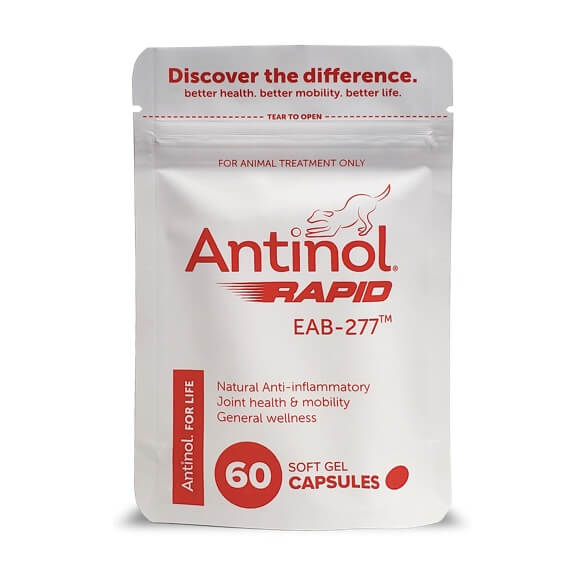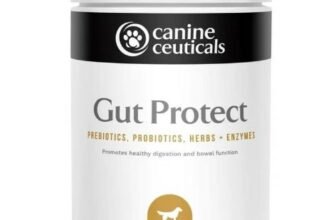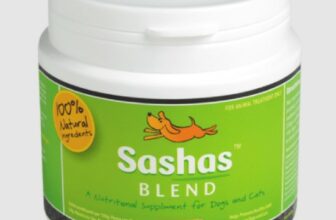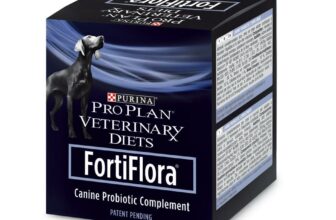
In Australia we have two leading joint supplements as recommended by vets – Antinol Rapid and 4CYTE Canine.
If you’re here reading this, my guess is you’re trying to decide which of the two is the best choice to support the joint health of your dog.
Antinol Rapid is a beneficial supplement for canine joint health, and worth considering if your dog has been diagnosed with a joint condition, or even as a preventative.
I’ve found it’s really easy to give to your dog – either as a treat, or you can piece the capsule and add the liquid to your dog’s food.
Related: A guide to all joint supplements for dogs in Australia.
In this review of Antinol Rapid we’ll take a look at the following:
- Why would you give your dog Antinol Rapid?
- Antinol Rapid ingredients
- Important considerations about your dog’s joint health (PLEASE READ)
- Where to buy Antinol Rapid in Australia for the best price
- Antinol Rapid for Cats
- Are there any Antinol Rapid side effects?
- What other dog owners say about Antinol Rapid
Why would you give your dog Antinol Rapid?
If your dog is suffering a joint condition such as arthritis or dysplasia then it’s likely your vet will recommend Antinol Rapid as an inflammatory to reduce pain and increase mobility.
Maybe your dog has suffered a recent joint injury, which is common in working dogs and active breeds (yes, Border Collie owners this definitely applies to you!). In these cases Antinol Rapid can ease their discomfort and help their joints heal more rapidly.
If your dog breed is prone to joint problems, then Antinol Rapid may be used as a preventative. Supporting joint health in the puppy phase can lead to far better joint health in their older years, so it’s worth considering.
Breeds specifically prone to joint problems: German Shephards, Labradors, Great Danes, Rottweilers, Newfoundlands, Dachshunds (did you know Dachshund is the literal translation as “Badger Dog”?), Saint Bernards, Mastiffs, and Sheep Dogs.
Keep in mind you can easily support the joint health of your dog with cheap and simple ingredients in their diet as well – more on this later, so stay tuned!
Antinol Rapid ingredients
When we look at the ingredients of Antinol Rapid we find they’re very simple – a combination of extracts of Green Lipped Mussel and Antarctic Krill.
Both of these ingredients are backed by a great deal of established research on their benefits for joint health, and both are considered safe.
Antinol is made in New Zealand which comes as no surprise when green lipped mussels are a key ingredient.
We find green lipped mussels in top dog foods like ZIWI Peak and Zealandia which also come from NZ, so for those feeding such a brand you’re already helping protect the joint health of your dogs!
A study of Antarctic Krill was released this year (2022) from CSIRO Australia from a randomised controlled trial of 235 human patients. The study showed strong evidence of significant improvements in knee pain, stiffness, and physical function. Being a combination of phospholipids, omega 3 fatty acids EPA and DHA, choline, and astaxanthin, Antarctic Krill has been used as a natural supplement for osteoarthritis and joint health for years.
To you and me that means the research is sound, and will definitely benefit your dog’s joints.
I’ve been an advocated for green lipped mussel for years, and really see a benefit as an inclusion in dog foods in general. There has been a great deal of evidence they work as an anti-inflammatory to reduce pain, and also help protect joints day to day. Sometimes you can buy them fresh/frozen from local supermarkets, so keep an eye out – they make great once-a-day dog treats!
Antinol Rapid vs. 4CYTE Canine ingredients
I’ll skirt over the differences between Antinol Rapid and 4CYTE Canine if you’re trying to decide which is best for your dog.

4CYTE Canine has four ingredients compared to the two ingredients of Antinol Rapid (extracts of green lipped mussel and Antarctic krill):
4CYTE Canine ingredients: Green Lipped Mussel, Shark Cartilage, Biota Orientalis Seed Oil, and Abalone.
Shark cartilage is an excellent source of glucosamine and chondroitin which work wonders for joint health. Biota Orientalis seed oil is plant based and believed to promote regrowth of cartilage.
Based on that, it would seem Antinol Rapid targets the reduction of inflammation and support, whereas 4CYTE Canine may be more beneficial in repairing damaged joints and cartilage.
Because of that, you may opt for 4CYTE instead of Antinol Rapid.
Related: 4CYTE for dogs review.
One point I’ll add about 4CYTE, is while researching I found a few negative consumer reports, mostly with symptoms of intolerance. I’m not certain, but I believe these may be caused by abalone. There’s evidence a small percentage of dogs may have a sensitivity to abalone (used in 4CYTE as a source of omega-3, calcium, phosphorous, and potassium), and the feedback I read could be explained by this.
Important considerations about your dog’s joint health (PLEASE READ)
Did you know 1 in 5 dogs can suffer from poor joint health from the age of 1, increasing to 4 out of 5 dogs from the age of 8?
It makes you question why, doesn’t it?
If you’ve read any of the dog food reviews you’ll know how detrimental I consider most kibbles to be to the health of your dog. Especially those made mostly of wheat or cereal grains.
Unfortunately pet food marketing does a wonderful job of convincing us a pet food product is great, when the reality is even vet-endorsed prescription pet foods are made mostly from grains – even for factually obligately carnivorous cats.
It’s no wonder our dogs (and cats) suffer all manner of health issues as they age, with joint health being very closely related to diet.
I know we all do our very best to offer our dogs the best diet, and we should never feel guilty if we’ve perhaps fed them a dog food which wasn’t as good as we thought, but please consider this:
If your dog is suffering poor joint health, we must consider their diet (both currently and historically) as a possible cause.
If poor diet has caused poor joints, then it’s possible other aspects of their health are suffering – even if there are no symptoms yet.
We should always address diet concerns first, leaving a supplement like Antinol Rapid to provide additional benefits.
Sorry if that’s a little blunt, but I see far too many dogs medicated when their underlying diet remains poor.
Related: Dog food recommendations.
Where to buy Antinol Rapid in Australia for the best price
Antinol Rapid is available from the following retailers, and may also be purchased from Amazon.com.au.
Antinol Rapid for Cats
Antinol Rapid is also available for cats suffering joint health. It’s less common for vets to see cats suffering joint conditions, and it’s also something which more likely goes unnoticed by us as cat owners. Our cats get stiffer with age, especially when fed inappropriate kibbles, yet we more readily put it down to old age.
Our cats may also benefit from a joint health supplement such as Antinol Rapid, and your vet may prescribe it as a solution.
If your cat does get diagnosed with a joint condition, then make sure you consider the food you’re feeding as well.
Related: Cat food reviews.
Are there any Antinol Rapid side effects?
The great thing about Antinol Rapid is there are no known side effects and the supplement should be safe to use as a remedy or preventative, even alongside other medication.
As a simple formula of Antarctic krill and green lipped mussels I would not expect your dog to have any side effects, and as a supplement you will only feed Antinol Rapid in moderation.
What other dog owners say about Antinol Rapid
For a long time now I’ve seen nothing but positive feedback from other pet owners for Antinol Rapid. I mentioned earlier some negative reports with 4CYTE, but this hasn’t been the case for Antinol.
To summarise it seems Antinol Rapid can be a very good choice in helping your dog through joint conditions and joint pain.
Have you used Antinol Rapid (or 4CYTE Canine)? If so, feel free to add your experiences and opinions in the comments section below!







Sharing our experience with Antinol. Our 15-year-old Jack Russell X has always had a bit of a hip issue and has slowed down a lot with age, but still manages to get upstairs. A colleague at work mentioned Antinol helped their dog so we trialled it for a month.
We didn’t notice any difference but we have continued him on 1 tablet a day as a preventive measure, given there’s some science behind it and his love of jumping up and down and getting too excited for his age.
Before Antinol we fed a tin of sardines once a week. I think the Antinol must taste quite fishy because since starting it, our dog is very reluctant to eat sardines, unless it is the kind smothered in tomato sauce.
For full context, we normally feed Applaws dry food, Black Hawk tinned food, and occasional leftovers/unseasoned versions of our food and that hasn’t changed throughout.